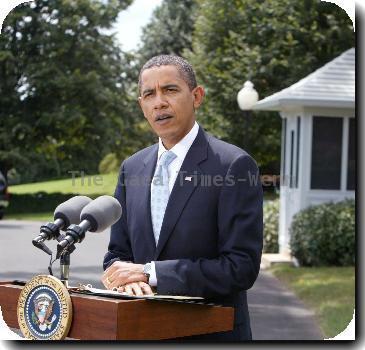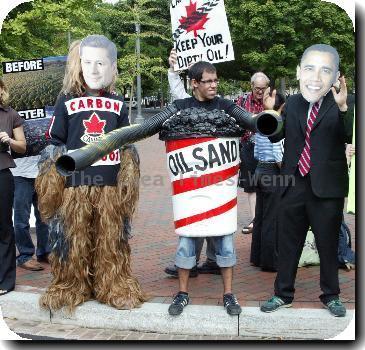Protests on both sides of Atlantic signal tough road before Copenhagen climate meeting
By Arthur Max, APTuesday, November 3, 2009
Climate talks face difficult road ahead of meeting
Boycotts on either side of the Atlantic on Tuesday showed just how difficult it will be to clinch an agreement on global warming next month.
At U.N. climate talks in Barcelona, Spain, African nations walked out of meetings to protest rich nations’ reluctance to make substantial carbon-cutting commitments. In Washington, some conservative Republicans boycotted the start of committee debate on a bill to curb greenhouse gases, fearful of the cost to the U.S. economy.
German Chancellor Angela Merkel, in a bid to support the Democratic-sponsored climate bill, told a rare joint session of Congress “there is no time to lose” in tackling climate change.
But the lukewarm response to her comments on global warming — in contrast to the ovations she received at other times — only underscored the skeptical mood in the United States about climate action, which would require a shift away from fossil fuels to wind and solar power, smaller cars and — the Republicans argue — more expense to consumers.
GOP senators on the Environment and Public Works Committee shunned the planned startup of voting on amendments to the bill. Only Sen. George Voinovich, R-Ohio, showed up and he stayed only for 15 minutes to give the reasons for the Republicans’ absence.
African countries ended a boycott of meetings in Spain at U.N. climate negotiations, having reset the talks’ agenda to spend more time on complaints that industrial countries had set carbon-cutting targets too low for reducing global greenhouse gas emissions.
The parallel actions were elements of a dramatic finale leading up to the 192-nation conference in Copenhagen on Dec. 7-18, which is meant to adopt a treaty regulating carbon emissions that will shake economies around the globe.
The African revolt was largely symbolic, since it was clear that industrial countries cannot alter their positions without high-level political decisions by governments.
But it was a signal that hard-liners would dominate negotiations by the developing countries at the decisive Copenhagen forum, and marked the 50-nation African group as an influential player on the global stage.
The Africans, supported by about 70 other developing countries, including China, say the industrial world is failing to live up to pledges of deep cuts in emissions, while droughts and floods already are causing death and devastation on the badly hit continent.
“I don’t think we can get to a result in the way we’re going now,” said Algerian negotiator Kamel Djemouai, who chairs the Africa group. “The figures that are now on the table are not really ambitious.”
The White House and Democratic leaders in Congress have essentially abandoned prospects of getting a climate bill to President Barack Obama’s desk before the Copenhagen meeting. But they hope a show of progress in the Senate — along with the House having passed a bill and Obama’s call for more fuel-efficient cars — will show the world the U.S. is taking climate change seriously.
U.N. Secretary-General Ban Ki-moon acknowledged the climate change treaty may not be resolved this year, adding that nations may be unable to commit to firm emissions limits at Copenhagen.
“We may not be able to agree (on) all the words,” Ban said after meeting in London with British Prime Minister Gordon Brown. Ban said he would push leaders to strike a pact in Copenhagen, but that it was more likely to be an agreement on principles — rather than specific targets for cuts.
“We need at this time the political will — if there is a political will, there is a way we can come to a binding agreement in Copenhagen,” Ban said.
Scientists say industrial countries should reduce emissions by 25 percent to 40 percent from 1990 levels by 2020, but the targets announced so far amount to far less than the minimum.
The Africans say new climate studies show the dangers are even greater than thought just a few years ago, and that industrial nations should reduce emissions by at least 40 percent by 2020.
The U.S. delegation has refused to say what its figure will be until it gets a green light from Congress.
“It’s really good that the Africans have finally been able to stand up together,” said Fiona Musana of Greenpeace Africa. “That sends a strong signal.”
A new study published Tuesday says the glaciers on Africa’s highest mountain, Kilimanjaro, have lost 85 percent of the ice they had in 1912, with more than a quarter present in 2000 gone by 2007.
The study, in the Proceedings of the National Academy of Sciences, cited Earth’s rising temperatures as at least a partial cause. It said similar changes have occurred at Mount Kenya and the Rwenzori Mountains in Africa, as well as at glaciers in South America and the Himalayas.
Climate negotiators are closely watching events in Washington. The standoff in the Senate committee was precisely the kind of confrontation that aroused concern among the delegates and calls for the U.S. to declare its intentions before the Copenhagen meeting.
The Copenhagen measure would succeed the 1997 Kyoto Protocol, which called on 37 industrial countries to reduce heat-raising gas emissions by an average 5 percent below 1990 levels by 2012. It made no demands on developing countries such as India and China.
The Clinton administration signed the protocol but never sent it to the Senate for ratification, saying it wanted the agreement to include developing nations first. The treaty is not binding on the United States unless the Senate ratifies it.
Then, former President George W. Bush said he would not send it to the Senate for ratification, making the U.S. the only country to have signed the accord to say it has no intention of ratifying it.
Merkel assured Congress that China and India will agree to accept limits on their own carbon emissions as part of a Copenhagen pact, if the U.S. does.
After meeting the German leader in the White House, Obama reiterated his determination to join an international climate regime.
“The United States, Germany and countries around the world, I think, are all beginning to recognize why it is so important that we work in common in order to stem the potential catastrophe that can result if we continue to see global warming continue unabated,” he said.
Obama also met with European Union leaders hoping to advance a climate policy. He said he and the European leaders agreed it is imperative that they redouble efforts to reach a climate deal in Copenhagen. European Commission President Jose Manuel Barroso said he emerged from the talks more confident about climate progress.
Barroso said forging a climate deal would be “a defining moment” for his generation of world leaders, and that he was worried by the lack of progress toward a final agreement in Copenhagen. But he dismissed the suggestion of aiming for a watered-down treaty.
“If you start to speak of Plan B in Copenhagen, you will probably end up with Plan F,” he said.
Max reported from Barcelona, Spain. Associated Press writers Desmond Butler and Randolph E. Schmid in Washington and Michelle Faul in Johannesburg contributed.
Tags: Asia, Barack Obama, China, Climate-talks, Copenhagen, Denmark, East Asia, Environmental Laws And Regulations, Environmental Policy, Europe, Events, Germany, Global Environmental Issues, Government Regulations, Greater China, International Agreements, Land, North America, United Nations Climate Change Conference 2009, United States, Western Europe



